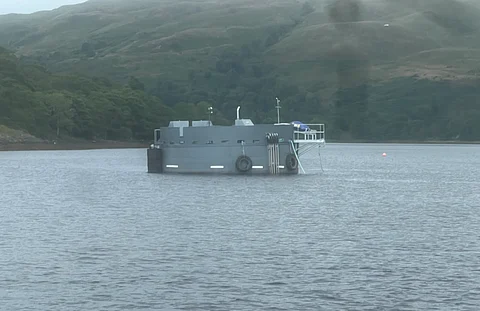

Mowi Scotland Sea-Cap feed barge at Loch Etive after refurbishment.
Photo: Mowi Scotland.
As part of a consolidation project to reduce from four to three its Loch Etive farms - acquired from Dawnfresh in 2022 - while ensuring that all operations and the visual appearance of the sites meet the highest standards, Mowi Scotland has delivered the first of three fully refurbished Sea-Cap barges.
From now on, the upcycled feed barges will be used to feed remotely from the shore base, reducing marine traffic on the lake and emissions from vessels. Two more barges, to complete the five existing when Mowi took over the sites, will be available for the company's operations in Ireland.
Communities asked for an impact reduction on the surrounding area
In February this year, Mowi's Loch Etive farms - which were rearing trout under the Dawnfresh brand - received their first shipment of juvenile salmon. This change came after the company held a consultation with local residents proposing to use these farms for post-smolt production, which, beyond the benefits to the salmon, would lead to a reduction in overall vessel activity on the loch.
"Upon consultation to gauge the views of the communities surrounding Loch Etive, residents were largely supportive of the changes to lower profile equipment and hybrid battery barges. Some fairly stated that farming operations could be tidier, so this shift is an important step to reduce the impact on the surrounding area," explained Clara MacGhee, Area Manager for Dawnfresh.
Echoing the consultation, Mowi Scotland opted for hybrid barges but also for upcycling. This term, which does not have an exact translation in all languages, not only implies recycling, but also creative reuse, and that is what the salmon company has done with the Sea-Cap barges at Loch Etive, now converted into low-profile unmanned feeding units thanks to the work of Gael Force Group, which Mowi commissioned.
Mowi Scotland Sea-Cap feed barge during refurbishment at Gael Force's facility on its quayside location in Inverness.
Photo: Mowi Scotland.
"We were challenged some years ago with how we may deal with end-of-life small concrete barges; whether to fully dismantle, decommission or re-purpose and we came up with the lowest impact idea to upcycle the Sea-Cap feed barges to unmanned low profile feeding units," explained Stewart Graham, Gael Force Group Managing Director.
"With the advances in technology and barges now being able to be remotely operated from feed control centres, it became clear that there was a potential large sustainability and economic upside to upcycling the barges. We reconfigured the designs, removing the superstructure thereby lowering the profile and the visual impact, fitted new up-to-date Gael Force SeaFeed systems and hybrid power solutions," he continued.
The result is, in his view, "a superb example" of low environmental impact and low-cost repurposing of an existing asset which, due to the hybrid system fitted, will now also run with very significant energy savings. So, Graham congratulated Mowi "for its vision and commitment to this ongoing upcycling project."
According to the information provided by Mowi Scotland, this upcycling of redundant concrete barge hulls into low-profile energy-efficient hybrid barges will provide sustainability benefits and cost savings of approximately GBP 4 million (EUR 4.7 million / USD 5.1 million) relative to purchasing new feed barges.
"The refurbishment and re-use of these redundant barges is a great use of resources with a positive outcome for the environment," said the specialist in vessel and barge engineering, Dougie Gibson. "All five barges have been fitted with sound proofing and designed to lessen the height and visual profile, reducing emissions and noise."
"Not only does this project represent an excellent example of the industry benefits from upcycling aquaculture assets, but also demonstrates to the wider aquaculture sector the breadth and depth of technical engineering competence which exists within Scotland," Gibson added, commenting on Mowi Scotland's work with Gael Force, which has been carried out entirely at the latter's facility on its quayside location in Inverness.
